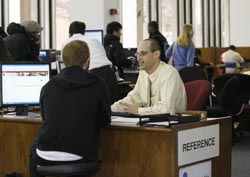Temple Libraries make online searching faster, easier
| When college students begin research for papers and projects, 89 percent start with search engines, while only 2 percent go to a university library site, according to the American Library Association. Why does this matter? Because even — and perhaps especially — in the electronic age, libraries are still the most organized, reliable places to get exactly what you need to solve a problem or answer a question, particularly when it comes to academic research. But going to the library can feel something like choosing between making a salad or picking up a bag of chips: You know the salad is better for you, but it seems so much easier to go to the vending machine. Search engines “vend” information, dispensing a mix of garbage, quality and so-so information in each set of results, without much differentiation. When it comes to adding real sustenance to research, the library still has a lot to offer. |
 Photo by Joseph V. Labollito/Temple University
Steven Bell, associate university librarian for research and institutional services, helps a student with his research on the first floor of Paley Library. Temple Libraries staff members are subject experts in many disciplines with advanced degrees in their respective fields, and are available by chat, phone and e-mail, as well as in person to help students and faculty find what they need.
|
|
Temple Libraries' staff members are subject experts in many disciplines with advanced degrees in their respective fields. These librarians are responsible for selecting and supervising the collections in their areas of study so that they can help faculty and students find the materials and information they need. To fully support the university's teaching, research interests and information needs over the past several years, the Libraries have increased book purchases; developed resources to support faculty research; subscribed to additional scholarly journals, magazines and newspapers; introduced a leisure reading collection; and licensed hundreds of new research databases. You don't need a master of library and information science or an entire afternoon to spend perusing the stacks to find these things. The Libraries, under the guidance of Larry Alford, dean of university libraries, have created several new ways to find good information fast. Ask a Librarian RefWorks LibGuide Subject Guides Additionally, librarians are now creating custom-designed LibGuides for specific courses that point students to research resources that faculty want students to use for their research assignments, said Steven Bell, associate university librarian for research and institutional services. MultiSearch The tool also contains an option that gives researchers the ability to customize their search by choosing library databases to be searched in any number of combinations, either those pre-determined by librarian subject specialists or those they select themselves. TUlink Blackboard "This feature, adopted by all spring online courses, gives students the convenience of being just one click away from online academic articles," said Dominique Monolescu Kliger, assistant vice provost and director of Distance and Summer Programs. The packages create a "library express" area inside the course site, making access to relevant articles, databases and other library resources quicker and easier for students, said Jenifer Baldwin, head of reference and instructional services. The packages consist of resources such as reserve readings, quick-search boxes for scholarly databases, a chat tool used to reach a subject librarian directly and the Subject Guides for topic overviews and guides to starting research. Additional initiatives Each year, the library system holds more than 100 instructional sessions to make members of Temple's community aware of the academic resources right at their fingertips. "[Temple] is committed to making these resources available to our students and faculty for the purpose of accessing the scholarly work of their peers and of the experts in their fields," Bell said. "Many people who come to Temple as freshmen are unaware of how to get these resources and how to use them efficiently; a core Library mission is to create awareness of these resources and help our community to maximize their use." In today's world, there are millions of information sources on the internet, but Temple's goal is to teach students which ones are reliable, high-quality and serious, said Bell, whose blogs on academic librarianship and higher education are occasionally highlighted on The Chronicle of Higher Education's web site. Faculty also benefit when students submit well documented, higher quality research papers; avoiding "garbage" means better writing, better reading and better results, Bell said. To learn more about Temple's Libraries and the services they provide, visit http://library.temple.edu or contact your subject specialist through the "Subject Guides" icon located on the homepage. Temple Libraries by the numbers 400-plus electronic databases containing academic journals, thousands of popular newspaper and magazine titles, hard-to-find government documents, e-books, full-text copy from online blogs and numerous trade magazine publications. 40,000 periodicals covering topics ranging from landscape architecture to presidential primaries to music therapy. 250 library databases can be searched at once using MultiSearch 300,000 songs in every style, period and genre can be heard by users of American Song, a newly acquired online streaming audio resource, plus Smithsonian Global Sound and Naxos Music Library 3.5 million searches conducted in 2007 by Temple University faculty, students and staff in licensed database resources (not including the Diamond library catalog) |
|